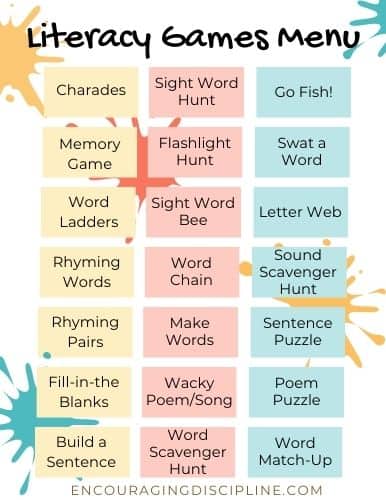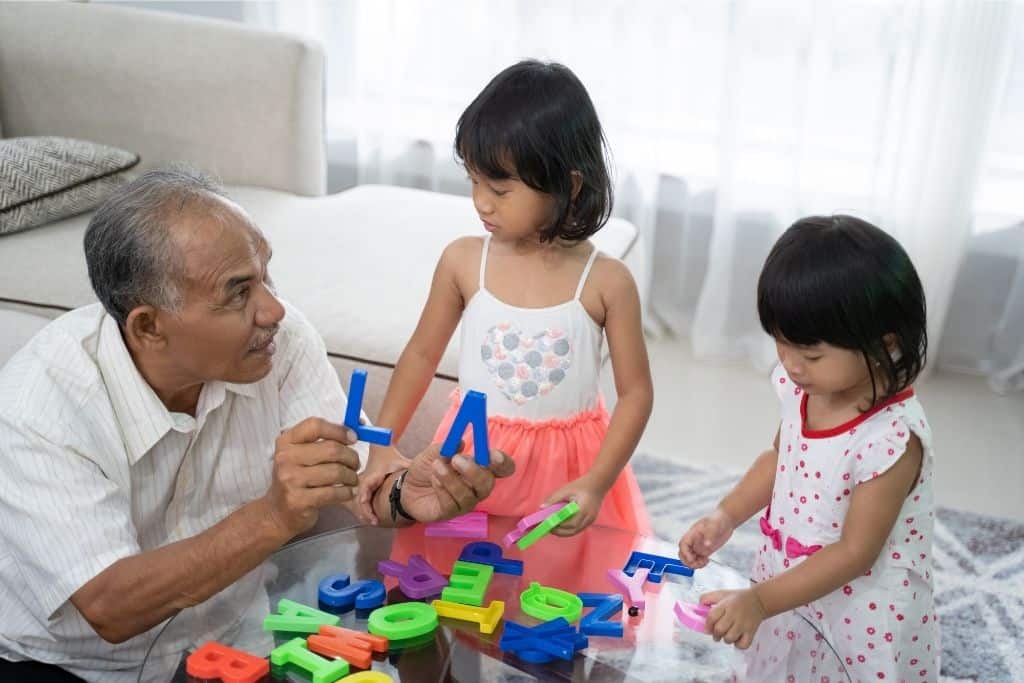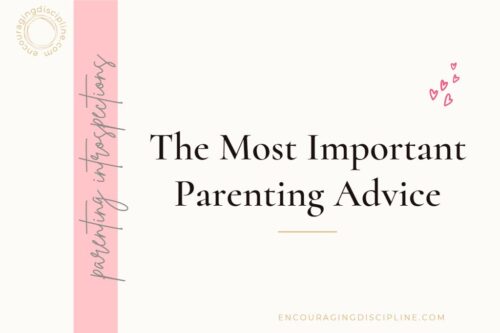21 Literacy Games to Keep Your Kids Busy and Learning
In this post, you will find 21 literacy games that will keep your kids entertained and learning for longer than 3 weeks. Of course, you should continue reading to your child every day. And you should also create alluring opportunities for your child to read to you or independently as well.
Related: Benefits of Reading Aloud to Children
Many children are at home these days. And with some states considering keeping schools closed for the rest of the academic year, you may be wondering how you can make sure your children do not regress too much in reading. When children are young and beginning to read, it is helpful to incorporate literacy games and activities in their everyday lives so they can continue practicing vital skills that will ensure they can grow as readers.
Table of Contents
Free Literacy Games
The games I have compiled here are free, you don’t have to buy any materials, and they take little to no time to set up. For many of them, I recommend writing the words on index cards, but you can also just cut paper into squares or rectangles and write the words on them.
In addition to being simple to create, the games listed below are fun and engaging, and children learn without even realizing it. My children like to play some of these games by themselves in the car, at the dinner table, or while building with Legos, pretty much anytime, anywhere. They simply think it is fun to look for patterns in the language and they feel proud when they develop mastery.
Introduce Literacy Games Slowly
Although these games are a lot of fun, resist the urge to introduce more than one game a day at the most. It may be helpful to spread them out even more. Allow your child to explore and enjoy each game fully. Once he has more experience and relative mastery playing a game, you can introduce another. Once your child can play a few games, write them on a board or piece of paper and post them on the refrigerator. Allow your child to pick and choose a game to play from this “menu” of games.
You can also download the Literacy Games Menu poster that I created here.

Some of the games are very convenient. They can be played while you are doing housework or driving. For others, you have to join your child at the table, on the floor, or around the house.
These games are best suited for children aged 4-10, but they can be modified for older children as well. You can adapt and change some of the games to create new ones or to make them more challenging. The invitation is to have fun with sounds, letters, and words.
21 Literacy Games to Keep Your Child Busy and Learning
Playing With Sight Words
Sight words are words that children have to learn to recognize without having to decode them. You should be getting these words from your child’s school.
- Charades – Write down sight words on index cards. One player takes a card, reads the word to herself, then acts out the sight word for the other players to guess.
- Sight Word Hunt – Write sight words on index cards and stick them on the walls around the house. Give each player a sheet of paper with the words written in boxes. The players have to run around the house to look for the words and mark them on their sheets when they find them. For a bit more challenge, the players have to trace the words they find on their sheet or they can get a blank sheet of paper and write down all the words they can find in boxes.
- Go Fish! – Write each sight word on index cards twice. Play a fun game of Go Fish!
- Memory Game – Write the sight words on index cards twice. Each player turns over two cards. If they match, she keeps them. If the cards don’t match, they are turned face down again and the other player has a turn.
- Flashlight Hunt – Write the sight words on index cards and stick them on the walls. Turn off the lights and use a flashlight to find the words and read them.
- Swat-a-Word – Write the sight words on index cards. Spread them face up on the floor or table. Give each player a clean fly swatter or make your own using craft sticks and card stock. Say a word. The first player to find and swat the word gets a point or keeps the card.
- Sight Word Bee – Write all sight words on index cards and lay them on the table or put them up for all the players to see. Then give up to 5 clues so they can guess the word. This can be played individually or in teams. Each player or team can get points depending on how many clues they need to figure out the word.
EXAMPLES
- 1st clue = 5 points
- 2nd clue = 4 points
- 3rd clue = 3 points
- 4th clue = 2 points
- 5th clue = 1 point
☛ For older kids, you can make that 500 points, 400, and so on, then have them add at the end to find their final score.
☛ For really young children, I would skip the points.
SAMPLE CLUES
- This word has ___ letters.
- The word begins with the letter ___.
- The word ends with the letter ___.
- This is a question word.
- The word means the same as/the opposite of ___.
- This word is a noun/verb/adjective/adverb.
- The word has a prefix/suffix.
Playing With Sounds
This is what teachers call “phonemic awareness”. Through these games, children develop the ability to hear and manipulate sounds easily.
- Word Ladders – Write down a word, then ask the child to change a letter in order to make another word. Give clues to the meaning of the new word.
Example: start with CAT. Change the first letter to make a word that means a short sleep you take during the day. The answer is NAP. Continue with as many words as you like. - Letter Web – Say the ABCs in your mind. When your child tells you “Stop!”, you say the last letter. Then you all think of as many words beginning with that letter as you can.
- Rhyming Words – Say a word and come up with as many rhyming words as you can.
- Word Chain – Say a word. The other player has to continue by saying a different word that begins with the ending sound (or letter for older kids) of the word you said.
Example: car (ends with the sound /r/). The other player says a word that begins with /r/, such as red. The last sound is /d/. The next player can say door. And so on. To make it more challenging, you can time the players. For instance, they have only 5 seconds to come up with a word. - Sound Scavenger Hunt – Go on a scavenger hunt around the house and look for all the things that begin with a particular sound.
Example: look for all the things you can find that begin with the sound /s/. - Rhyming Pairs – Write pairs of rhyming words on a sheet of paper and have your child find the pairs and color them the same color, a different one for each pair.
Playing With Letters, Words, and Sentences
- Make Words – Write a secret word, then cut out the letters and let your child make as many words as he can with the letters. Record the letters on a sheet of paper, sorting them into columns: 2 letter-words, 3-letter words, 4-letter words, and longer ones for older children. The players get bonus points for guessing the mystery word.
- Sentence Puzzle – For very young children, who are just learning how to read: read an easy book together, one that has only one simple sentence per page, like the Bob books. Then copy that sentence on a piece of paper, cut the words apart and have the child reconstruct the sentence by looking at the book.
- Fill-in-the-Blanks – Write down a nursery rhyme, then erase or cut out random words. Give your child the cut-out words and let him figure out where they go in the poem. After placing all words where they belong, read the poem together.
- Wacky Poem/Song – Say or write a poem or song that your child knows well. Then begin replacing random words in the poem or song and still make it rhyme.
- Poem Puzzle – Write a well-known, simple poem or song on paper. Then cut out the lines and let your child put them in order to recreate the poem. Read the poem when you are done.
- Build a Sentence – Together with your child, write a sentence about a story you read together, something you did that day, or any other idea. Then cut the words apart and have your child reconstruct the sentence by gluing the words in the correct order.
- Word Scavenger Hunt – Write words on cards and give each player a card. The children go around the house and look for the object written on the card. When they find it, they return the object and the card to the table and grab another card. In the end, there should be word cards and objects matched up on the table. You can practice reading together all the words.
- Word Match-Up – Similar to the previous game, lay out on the table several word cards and objects (or pictures). The children match the word cards with the objects or picture cards.
More Literacy Games
For some very interesting reading games, check out Reading Rockets. They have lots of reading resources, and this page in particular describes a few interesting reading games that I haven’t seen elsewhere.
There are lots of games that are great for building vocabulary, reading, and spelling skills that you can purchase as well. Some are: Didax Chunks, Zingo, Boggle Jr., Reading Rids Words, Reading Rods Sentences, and Sentence Builders.
To Sum Up
Learning happens naturally when it is fun and children are motivated to do the activity. I hope these literacy games will keep you, and especially your children, busy for a long time.
Leave a comment below to let me know which literacy game is your child’s favorite.







